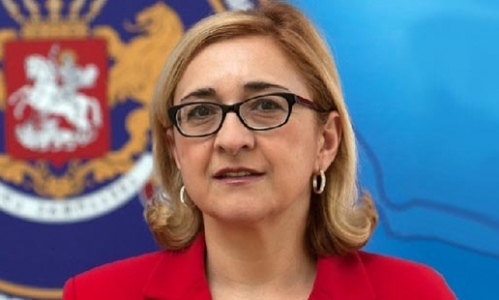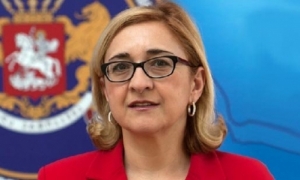Beruchashvili Pushes for EU Support ahead of Riga EAP Summit
Tamar Beruchashvili, Georgia’s Foreign Minister, has called on European Union leaders to express their support for Georgia’s European future at the forthcoming Riga summit. The Foreign Ministry says that over 14 media sources in the EU countries printed Beruchashvili’s article prior to the summit.
In the article published in NewEasternEurope (NEE), entitled aCritical Summit, Beruchashvili notes that Georgia has taken big steps toward European and international standards in general, as well as in terms of visa liberalisation.
“When the leaders of 34 countries meet on May 21-22 for the Riga Eastern Partnership Summit, we will be confronting geopolitical realities which are dramatically different from those which framed our last gathering. Already in Vilnius in November 2013, the Russian Federation posed a serious challenge to the basic principles of international law and praxis, including the sovereign right of nations to decide their own future. However, since then, Moscow has gone much further in its aggressive attempts to tear down the very fundamentals of the European security architecture,” the Minister writes.
The Georgian politician views the general picture of Georgia’s achievements and its current international and democratic standing: “Over the last two and a half years alone, we have - with the support of our EU partners - made great strides in bringing Georgia into line with the highest European and international standards. Today, we are proud to be recognized as a regional leader in terms of democracy and human rights, a stable and secure investment destination in a key strategic location and a pro-active contributor to European and international security.”
Beruchashvili explains that removing visa requirements for Georgian citizens to travel within the EU will mean more tourism, cultural, student exchanges, and civil society partnerships. This will help Georgia to develop and anchor the next generation firmly within the European family of nations. Most importantly, it will provide a clear demonstration to the people of Georgia, including in the occupied territories of Abkhazia and Tskhinvali region (formerly South Ossetia), and to those of the other Eastern Partnership countries, that the EU upholds a merit-based approach and delivers on its promises.
Unexpectedly, Georgian Justice Minister Tea Tsulukiani stated that Georgia has never had expectations about receiving visa liberalization at the Riga summit, and the government has never been given that impression. “After signing the Association Agreement, we made it clear, not to expect visa-free travel with the EU immediately after the Riga summit,” she claimed.
Meanwhile, Georgian President Giorgi Margvelashvili at a joint press conference after meeting with his Austrian counterpart on May 18 expressed his hope that Georgia will see very principled steps at the Riga summit, which will be taken for strengthening peace and stability in Europe.
Author’s Analysis
Some confusion among government leaders and dis-coordination are plain to see, as the members of the same cabinet have varying approaches to Georgia’s foreign affairs. At the same time, Georgia has been facing problems in the regions of the Caucasus and Black Sea, as its Northern neighbor Russia does its best to obstruct the country from the progressive path chosen.
Former Georgian senior diplomats and experts have accused the government of being inactive in the process, which needs proactivity and rational policymaking, instead of ‘flirting with Russia’.
What should Georgia expect from the Riga Summit? Informally, it is already widely known that there will be no tangible progress to report.
Zviad Adzinbaia












